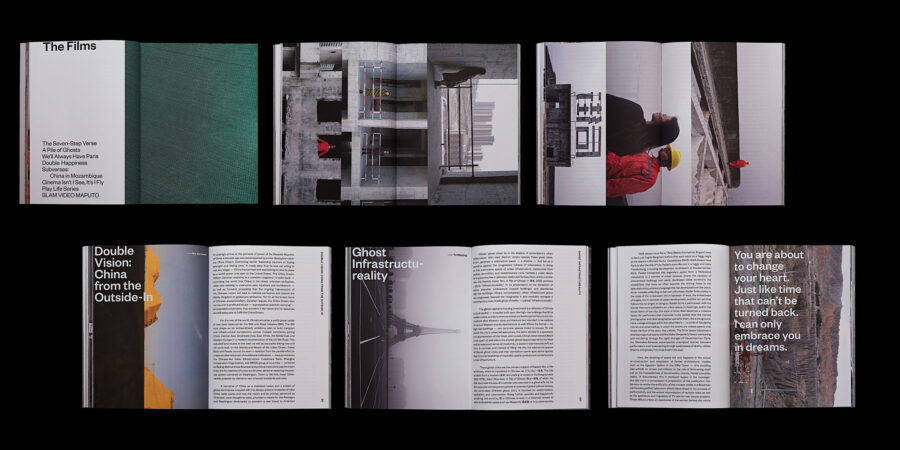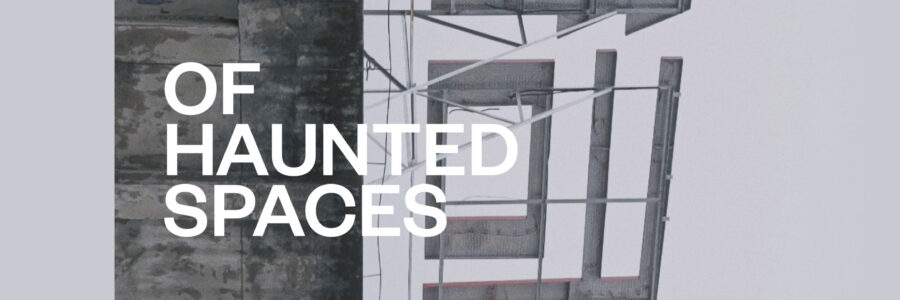

Of Haunted Spaces, The films of Ella Raidel,
Cinema, Heterotopias, and China’s Hyperurbanization
Edited by Ute Meta Bauer
with contributions from Itty Abraham, Ute Meta Bauer, Marlene Rutzendorfer, and Yu Weiying
As amalgams of the different spatial logics of other places, reassembled by globalization and the fantasies of real estate development, cities today are becoming what Michel Foucault has termed heterotopias. Assemblies of ruins, theme parks, entirely copied towns, simulacra, business districts on a globalized template, reconstructed historic districts, settlements, and ghost towns are finding a new expression in the contemporary world. Nowhere has this become more visible recently than in China and in areas under China’s developmental influence. Copied cities, ghost cities, and large-scale Chinese investments in Africa are heterotopias because they contain the idea of accumulating different times, cultures, and countries within one place, just as a theme park contains all these different place experiences in a bounded zone outside of its own time and culture.
Ella Raidel has explored these phenomena through film and cinematic virtual reality, and this artist’s book reviews reflect the last two decades of her award-winning work. In Ella Raidel’s films, urbanism and architecture, theory, politics, social change, and image production are intertextually presented, opening a discursive space for investigation and commentary. This book will be interesting for art and film practitioners and students of architecture, film, urbanization, and infrastructure, especially those who see cinema as a way of exploring these subjects.
Order here: NUS PRESS
Published by NTU Centre for Contemporary Art Singapore
ISBN: 978-981-18-5893-2
Distributed by NUS Press Singapore
Editor: Ute Meta Bauer
Designer: Swell Design Singapore
NTU Centre for Contemporary Art Singapore
Book Review, September 2025 by Adrian Tan:
Adrian Tan. 2025. “Book Review: Of Haunted Spaces: Cinema, Heterotopias, and
China’s Hyperurbanization.” Wacana Seni Journal of Arts Discourse 24: 150–154.
To link to this article: https://doi.org/10.21315/ws2025.24.10
More than an artist monograph, this volume brings together contributions by Ute Meta Bauer, Marlene Rutzendorfer, Itty Abraham, and Yu Weiying, situating my hybrid documentary-fiction films within broader conversations on heterotopia, speculative urbanism, postcolonial theory, and architectural cinema. As Tan writes, Ella Raidel’s “situated cinema” is more than observation—it is a transformative act that reveals hidden infrastructures and power structures shaping our world. The book highlights how film, art, and research intertwine to open new ways of experiencing and reflecting on urban space beyond official narratives.
http://ellaraidel.com/wp-content/uploads/ws24_10_UNIVERSITI-SAINS-MALAYSIA.pdf
Book Review, Camera Austria 166/ 2024, pp.86-87 by Maren Richter
published 12/06
Translated from German:
Ute Meta Bauer (ed.), Ella Raidel, Of Haunted Spaces, Heterotopias, and China’s Hyperurbanisation NTU Centre for Contemporary Art, Singapore 2023,
by Maren Richter
For two decades, Singapore-based Austrian filmmaker Ella Raidel has been working and researching China’s efforts to transition from a communist-capitalist two-system state to a neo-colonial superpower. Using essayistic narrative forms, located somewhere between documentary and feature film, she dissects places that represent both dream and trauma – gigantic property projects, copies of European cities, landmarks and villages, often objects of speculation that are preceded by fantasies of political omnipotence and end up as ghost towns. The artist often shoots her “performative documentaries”, as she characterizes her working method, in guerrilla style in the absence of permits and uses the re-enactment of what she has observed – tracked down in urban interstices and at the transitions from one era to another.
The book Of Haunted Spaces, edited by Ute Meta Bauer, explores Ella Raidel’s complex filmic journeys into a fictional real, experimentally and poetically enriched by soundscapes, references to Western film history, Eastern poetry and superimpositions of temporalities in the structure of urban narratives, in which the city itself seems to become an (exhausted) protagonist, as Marlene Rutzendorfer adds. In her essay “The Poetry of Haunted Spaces”, the urban theorist describes Raidel’s films as documentary dramas that form “their own syntax of architectural filmmaking” and go beyond the description of spaces or the tracing of the history of the built environment. They are fabricated realities, fabulations that blur fact and fiction, brought together by protagonists who are haunted by ghosts from different eras.
The ghost infrastructure is not an accidental counterpart to capitalist urbanization, according to Yu Weiying, but emerges as an unavoidable yet discursive force from the abundance of the Capitalocene. In her contribution, the author examines the newly configured Chinese ghost cities as performative entities and outlines the idea of “ghost infrastructural(e)ality” with particular reference to Raidel’s latest film A Pile of Ghosts (2021), which she characterizes as infrastructural spatial productions of an urban reality speculatively haunted by a seemingly promising but unfulfilled future based on global capital. The story about a hotel owner’s silent resistance to the urbanization of Chongqing, which begins as a documentary and increasingly turns into a dream, ghost and love story, is, like all of Raidel’s films, inspired by Southeast Asian independent films. It is the last of a trilogy that began in 2011 with the film SUBVERSES China in Mozambique, based on the recordings of an anonymous Chinese worker, in which Raidel addressed China’s neo-colonial strategy of building infrastructure in exchange for raw materials. This investment invasion in Africa seemed to be a kind of test phase for the Xi Jinping regime before it imagined itself as the world’s largest economic power with the announcement of the gigantic global infrastructure project of the New Silk Road in 2013.
Itty Abraham examines the trilogy, which also includes Double Happiness, about the replica of the Austrian Hallstatt in China, from this perspective. The postcolonial expert introduces his text with the “Chinese Dream” – a complex imagination that reminds the world that China is the oldest unbroken civilization, overcoming past injustices and looking forward, suggesting that “rejuvenation” will help achieve national perfection and lead to global supremacy. Yet for all the kinetic power of Chinese exceptionalism, the China Dream harbours deep doubts, articulated as a “patriotic anxiety” about whether the nation and its resources are still sufficient to fulfil the dream (p. 87).
For Abraham, the three films are a narrative about shifting borders, not territorial borders, but rather urban, historical and temporal ones. Taken together, the trilogy offers a vantage point from which to assess and understand the gaps and contradictions within an increasingly overheated geopolitical echo chamber. The book on Ella Raidel’s long-term research is, like her work itself, a kaleidoscopic journey of discovery into global shifts, exhaustion and borders.
Book Review, Geistergegenwart, RAY Filmmagazin 12/23+01/24, pp.68-73
Text und Interview – Andreas Ungerböck, LINK
A comprehensive and detailed book review spanning six pages in Ray Filmmagazin.
Eine umfassende und detaillierte Buchrezension über sechs Seiten im Ray Filmmagazin.

